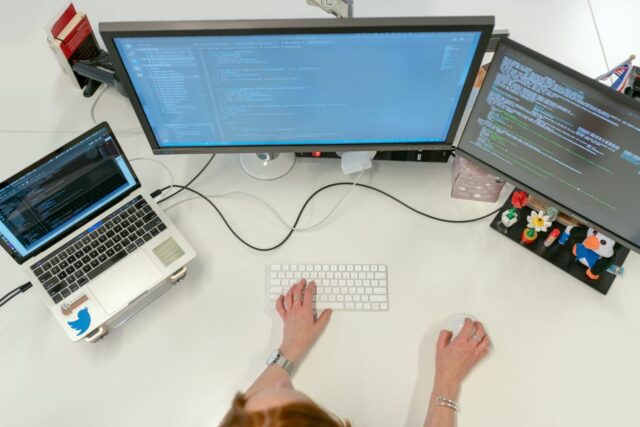
The COVID-19 pandemic has dramatically altered the way we work, with remote work becoming the norm for many industries. The tech industry, in particular, has seen a surge in remote work as companies adapt to the changing landscape. For software engineers, remote work offers the flexibility to work from anywhere in the world, as long as they have access to a computer and internet connection.
In this article, we will explore the future of employment processes for remote software engineers and the trends that are shaping this rapidly evolving industry.
The Current State of Remote Employment Processes for Software Engineers

The traditional employment process for software engineers typically involves in-person interviews, technical assessments, and job offers. However, remote work presents unique challenges for companies, such as finding qualified candidates who are a good fit for remote work and ensuring that communication and collaboration remain effective in a virtual environment.
To address these challenges, companies have begun to adopt new recruitment strategies, such as virtual job fairs and online technical assessments. Video interviews have become the norm, allowing companies to evaluate candidates from anywhere in the world. Additionally, companies are leveraging AI-powered recruitment tools to help screen resumes and identify top candidates.
The Benefits and Challenges of Remote Work for Software Engineers
Remote work offers many benefits to software engineers, including the ability to work from anywhere, flexible schedules, and a better work-life balance. It also allows companies to access a global talent pool and reduce overhead costs associated with traditional office spaces.
However, remote work also presents unique challenges, such as the potential for isolation and difficulty in maintaining work-life balance. Collaboration and communication can also be more challenging in a virtual environment, requiring companies to invest in technology and tools to facilitate effective teamwork.
The Future of Remote Work for Software Engineers

The future of employment processes for remote software engineers is likely to be characterized by continued growth in remote work and new technology-driven solutions to recruitment and communication challenges. Companies will need to find new ways to attract and retain top talent in a competitive market, while also ensuring that remote work is accessible and equitable for all employees.
Leveraging Technology to Streamline the Recruitment Process
To meet the growing demand for remote software engineers, companies are turning to technology to streamline their recruitment processes. AI-powered recruitment tools are becoming more popular, allowing companies to screen resumes and identify top candidates quickly. Virtual job fairs and online technical assessments are also becoming more common, allowing companies to evaluate candidates from anywhere in the world.
Building Trust and Collaboration in a Remote Environment
One of the biggest challenges of remote work is building trust and collaboration in a virtual environment. Companies must invest in technology and tools to facilitate effective teamwork, such as video conferencing, chat apps, and project management software. It is also important for companies to establish clear communication protocols and foster a culture of openness and transparency.
The Importance of Soft Skills for Remote Software Engineers

Soft skills are becoming increasingly important in the remote work environment, as effective communication and collaboration are key to success. Software engineers must be able to work effectively in a virtual team environment, be proactive in seeking feedback, and be able to adapt to changing circumstances. Employers must consider these soft skills when evaluating potential candidates for remote work positions.
Communication and Collaboration Tools for Remote Work
Effective communication and collaboration are essential for success in remote work. Companies must invest in technology and tools that facilitate collaboration and communication, such as video conferencing software, chat apps, and project management tools. Employers must also establish clear communication protocols and ensure that all team members have access to the tools they need to do their job effectively.
Managing Remote Teams Effectively
Managing remote teams requires a different set of skills than managing in-person teams. Employers must be able to effectively communicate goals and expectations, provide ongoing feedback and support, and ensure that team members are engaged and motivated. This requires a culture of trust and open communication, as well as the use of technology and tools that support remote team management, such as project management software and collaboration tools.
The Role of AI in Remote Employment Processes
Artificial Intelligence (AI) has the potential to revolutionize remote employment processes, from recruitment to performance evaluation. AI-powered tools can be used to automate tasks such as resume screening, candidate matching, and even interviewing, streamlining the recruitment process and reducing bias. Additionally, AI can be used to monitor employee performance, provide feedback, and identify areas for improvement, enhancing the remote performance evaluation process.
Virtual Reality and Augmented Reality for Remote Workspaces

Virtual Reality (VR) and Augmented Reality (AR) technologies can create immersive remote work environments, allowing software engineers to collaborate and communicate as if they were in the same physical space. VR and AR can be used for remote training, team-building, and project collaboration, providing a more engaging and interactive experience than traditional remote work tools.
Remote Work and Employee Wellness
Remote work can have significant benefits for employee wellness, such as reduced commute times and increased flexibility. However, it can also lead to feelings of isolation and burnout if not managed properly. Employers should prioritize employee wellness by providing resources such as mental health support, ergonomic equipment, and opportunities for social connection.
The Importance of Mental Health Resources for Remote Workers
Remote work can present unique challenges for mental health, such as increased feelings of loneliness and difficulty separating work and personal life. Employers must prioritize mental health resources for remote workers, such as virtual counseling and support groups, to ensure that employees can maintain their well-being while working remotely.
Encouraging Breaks and Exercise for Remote Workers
Working from home can make it easy to fall into the trap of sitting for extended periods without taking breaks or engaging in physical activity. Employers should encourage remote workers to take regular breaks and engage in exercise throughout the day to maintain their physical and mental health.
Building an Equitable and Inclusive Remote Work Environment

Remote work can exacerbate existing inequalities, such as disparities in access to technology and infrastructure. Employers must work to build an equitable and inclusive remote work environment, by providing access to necessary technology and infrastructure, promoting diversity and inclusivity in hiring and team culture, and addressing barriers to remote work for underrepresented groups.
The Importance of Diversity in Remote Work
Diversity in remote work can enhance creativity, innovation, and problem-solving, as well as promote a more inclusive and welcoming work environment. Employers should prioritize diversity in their remote work hiring practices and team culture to ensure that all employees have equal opportunities for growth and success.
Addressing the Challenges of Remote Work for Underrepresented Groups
Remote work can present unique challenges for underrepresented groups, such as individuals with disabilities or those from low-income backgrounds. Employers must address these challenges by providing accommodations and support to ensure that all employees have equal opportunities for success in a remote work environment.
Creating a Global Workforce with Remote Work
Remote work can enable companies to build a global workforce, accessing talent from around the world without the need for physical relocation. This can provide significant benefits, such as increased diversity and innovation. However, it also requires employers to navigate different time zones, cultural differences, and legal and logistical considerations.
Conclusion
The future of remote work for software engineers is bright, with significant potential for innovation and growth. However, it requires employers to prioritize the development of remote work strategies that prioritize employee well-being, inclusivity, and equity, while also leveraging technology and tools to streamline recruitment and team management processes. With the right investments and focus on soft skills and diversity, remote work can provide significant benefits to both software engineers and companies alike.









